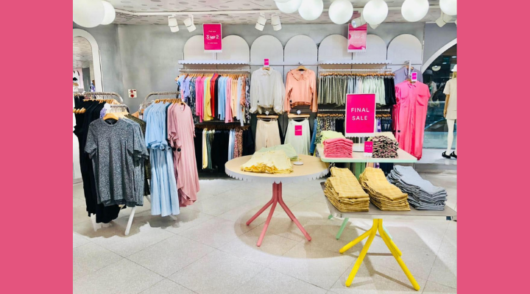As co-founder of the personal care brands Soma and Bronte Body, Camille Peressini is no stranger to the balancing act between purpose and performance. With career roots spanning from corporate giants like Mars UK to beauty heavyweight Mecca, she now leads with clarity, curiosity and a deep commitment to conscious business. In this exclusive Q&A, Peressini opens up about the non-negotiable rituals that anchor her days, the team values that shape her leadership style and the career advice that
hat’s stuck with her since her start in the industry. Whether scaling a side hustle or redefining leadership style, Peressini’s insights are a masterclass in staying intentional at each stage of the journey.
Inside Retail: What rituals or non-negotiables help anchor your routine, whether it’s morning habits, team check-ins or moments of creative thinking?
Camille Peressini: I’m very privileged in running my own business now that I get to ensure I’m home in the mornings and that my face is the first my kids see. Spending those first few minutes with them, almost every day, is the morning habit I try to protect as much as possible. It’s filled with cuddles and laughter and gives us a chance to talk about and plan our day, for the kids, but also for me.
It helps me mentally map out what’s ahead. Sometimes I write it down, but more often I’ll verbalise what I’ve got on, what matters most and where I want to land. It sets my focus, and hopefully helps the kids with theirs, too.
I’m also a big believer in touching base on the phone or in person, whether it’s a quick call in the car or during my commute, just to say hello and good morning to team members. Keeping it light, letting them know where I’ll be if they need me and vice versa before the email flow starts, is a small but important part of my routine.
IR: How did your early career choices shape your approach to building Soma, and were there any pivotal turning points along the way?
CP: I’ve taken something valuable from every chapter of my career, but one of the most defining lessons came during my time at Mars Wrigley in the UK. That experience, along with the roles that came before and after, gave me a deep appreciation for self-awareness, leadership and playing to your strengths, all of which have shaped how I’ve built Soma.
I was in a one-on-one development session with a senior leader, Mathew Austin. Mars is known for investing in people, and this was no different. He asked me to list the areas I was working on and rate myself from one to 10. Naturally, I gave myself low scores, they were in development after all. Then he asked me to list what I was great at and rate those, too. I gave myself 8s and 9s.
He took a marker, coloured in the remaining space to 10, and said that getting from an 8 to a 10 is far more efficient and rewarding than trying to push a 3 all the way up. Focus on what you’re already good at and become exceptional.
That moment completely shifted how I viewed development, not just for myself but for others. Of course, we all have growth areas, and we should keep working on them. But our strengths are our edge. If we sharpen them and use them well, we are far more effective, more fulfilled and more energised in the work we do.
It’s a mindset I’ve carried into building Soma, focusing not just on solving every weakness, but on backing the strengths we already have in our team, our product and our brand. It’s also how I lead. When you help people double down on what they do brilliantly, the results take care of themselves. I’ve seen it happen over and over again, their confidence lifts, their development accelerates and their impact multiplies.
IR: As a founder, context-switching is constant. Are there any systems, tools or practices you swear by to stay focused and protect your creative headspace?
CP: I’d be lying if I said I’d mastered this. I find it challenging to completely switch off or put something down without my mind drifting back to it. That back and forth can be mentally tiring.
Still, I know what fills my cup, and that’s my kids and family. They’re always my number one, so I find it easy to say no to anything that would compromise my time with them. Protecting that time gives me the headspace and energy I need for the things that are more of a grind or require deeper focus. I’m more content, and I show up sharper for everything else.
For some people, it’s the gym, or a podcast, or close friends. Whatever it is, I think it’s critical to honour it; it’s what keeps you full and ready for whatever the day throws your way.
I also believe strongly in taking annual leave. A big leave balance is not a badge of honour in my book. Time off, real time off, is essential.
IR: What’s one leadership lesson you learned the hard way, and how has it shaped the way you lead today?
CP: Some people reading this will laugh, but early in my career, I was constantly told to flex my style. Not to be inauthentic, but to be the best version of myself, depending on the audience or the moment.
At the time, I resisted. I didn’t understand what it really meant or why it mattered. But as I stepped into more demanding roles, with higher commercial stakes and bigger teams looking to me for guidance or being influenced by my behaviour, it started to click. Flexing your style means knowing your strengths, but also reading the room, pausing before jumping in, and choosing how and when to show up. Sometimes it means holding your tongue. Sometimes it means softening your tone. Sometimes it means not speaking first.
I love to lead and always have a point of view, but so do others. And giving people space, understanding their objectives and what’s important to them, often leads to better outcomes for everyone involved.
As a small business owner, I rely on many external inputs and relationships. The ability to flex my style, adapt, and bring the best out of a situation or partnership is now one of the most important tools I have.
IR: When it comes to building culture in a growing business, how do you think about balancing flexibility, structure and shared purpose, particularly in a hybrid or remote-first world?
CP: I feel strongly that the word ‘flexibility’ gets thrown around too casually, without enough thought about what it actually means. To me, it should be just that, flexible. It should be individualised, responsive and tailored to people’s different needs. What works for one person may not work for the next. The key is treating people equitably, not identically.
I was very lucky to report to Anna Croft during her time as COO at Mecca. Anna is a fantastic leader and applies this mindset with real intention. She leads with empathy, but also with structure and clarity, and it’s a balance I really admire.
I’m proudly a little old school, and I genuinely enjoy in-person interaction. I don’t believe we should be a remote-first world. The best ideas, friendships and breakthroughs in my career have come from being in rooms with other people, sharing energy, sparking creativity and pushing boundaries together.
Jo Horgan created a phenomenal culture at Mecca where that kind of creativity thrives. You can feel it in the room when talented people bounce off one another and challenge the status quo. That’s magic, and I believe it still matters.
IR: What’s a piece of career advice you often give to emerging creatives or strategists who want to chart a similarly ambitious, values-driven path?
CP: Roll up your sleeves, do the work and take in as many different experiences as you can along the way.
I started out as a graduate intern in supply chain at General Motors, then moved to Schweppes in procurement before transitioning into marketing. After that, I joined Mars in the UK, working in brand and later in sales back in Australia. Then came Mecca, where I learned about merchandising, buying and retailing.
The path has been anything but linear, but that’s the point. The breadth of experience has been one of my greatest assets. When I started Soma, there was very little my business partner Georgie and I couldn’t do ourselves. Between us, we’ve worn almost every hat, and it meant we didn’t need to outsource much in the early days.
When you’re bootstrapping, that matters. The knowledge you gather from those past roles comes back in ways you don’t expect, and can seriously accelerate your momentum.







